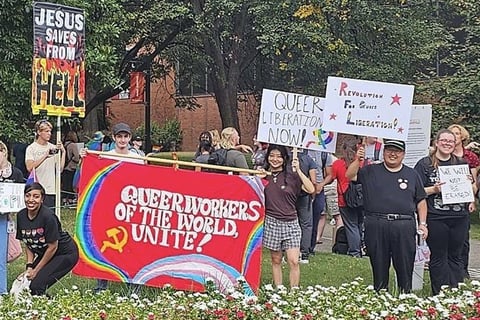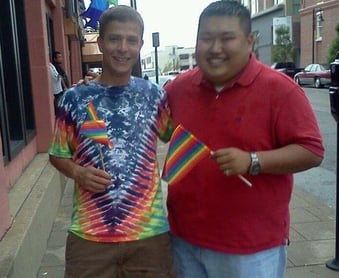Workers' Liberation is Queer Liberation
Benjamin A. Berry
6/5/2024
I was twelve years-old when I admitted for the first time, both to myself and to another person, that I was gay. Despite this, I don’t count December of 2003 as my “coming out” anniversary. The reason for this is because I was back in the closet by the time the calendar turned to 2004.
The people I told were my family members… my ultra-conservative family members. Of course, I received the typical responses:
“No, you’re not… you just haven’t met the right girl yet”
And “You’re too young to know what you are.”
And “You don’t want to go down that road… it’s a lonely, horrible life.”
And, who can forget the classic: “It’s against God and it’s a sin!”
By the start of 2004, not only was I back in the proverbial closet, but I was also enrolled in ex-gay therapy.
I won’t go into the sordid details of the six years I participated in ex-gay therapy (also referred to as conversion therapy or reparative therapy); though I am not ashamed of having undergone the experience, I have given my story to numerous groups and progressive news outlets over the years, and ex-gay therapy is not the central point of this article. Suffice it to say, for the six years—constituting the latter half of my middle school years and the entirety of my high school years—I went through the common practices of someone trying to rid themselves of their “unwanted same-sex attraction”: prayer, exorcism, self-harm, suicidal ideation, electroshock treatments (innocently termed “aversion therapy”), etc.
At eighteen years-old, having finally distanced myself from my conservative, hyper-religious upbringing, I fell into an eclectic group of coworkers with far more socially progressive values and came out of the closet for good on February 24, 2010… albeit with arms full of emotional baggage, including a severe alcohol abuse problem, PTSD, and recurring depression.
For me, coming out was certainly a liberating experience. To speak the words—I’m gay—and to be met by (mostly) supportive and loving responses was empowering. Given the years of repression and self-hatred, it was only natural that I wanted to devote time and energy to organizing for my queer community, to strive for the day when no other young person would go through the experiences I had underwent. In my early twenties, after having given up alcohol and having worked through the majority of lingering traumas from my teen years, I began volunteering with queer rights groups in the Commonwealth. To this day, I count many of the people I met through that work as friends and mentors and am always pleased when my contemporary organizing efforts intersect with the work of the activists who I had the pleasure of meeting over a decade ago.




However, the queer activist and labor organizer Mark Ashton once said, “It is really illogical to say: ‘I’m gay and I’m into defending the gay community but I don’t care about anything else.’”
This is the illogical chamber I actually found myself confined in during my early- to mid-twenties. I was highly involved in queer politics—lobbying, canvassing, demonstrating, etc.—but had little to no understanding of other oppressions in American society. Having discarded the old beliefs I once held regarding the LGBTQ community, I still clung to many ignorant and reactionary ideas from my upbringing: that unions aren’t needed in modern society, that the Black community is as much to blame for its woes as “systemic racism,” that corporations do more good than harm in the world, etc. In other words, I’d become a single-issue liberal with no understanding of class and how our class society poisons everything—the economic, the political, the social, the cultural.
It was not until I turned twenty-five that I began evolving in my understanding of these issues. Working under our current economic system tends to either radicalize or destroy a person. In my case, it was a bit of both: first a strong resurgence of depression, not caused by an internal conflict with my sexual orientation this time, but from a deep sense of futility and exhaustion that I now understand to be alienation—the feeling of disconnect and estrangement that working people experience as they are exploited for the benefit of the owning class. This initiated a period of study through which I became radicalized by learning about the Coal Wars of the militant unionists in Appalachia, the story of the Spanish Civil War (and the unrecognized Americans who fought and died for that cause), and the history of severe oppression from the American government against Labor throughout our nation’s existence. For the first time in my life, I began attending picket lines and standing alongside workers on strike, I participated in the Black Lives Matter protests of 2020, and I began reading economic theory that had never been presented to me (or had been presented in an overtly biased manner).
Through this process, this evolution of understanding, I came to appreciate Mark Ashton’s statement and the futility of focusing on a single social issue as though it exists within a vacuum. I came to recognize the interconnectedness of the economic, the political, the social, and the cultural. Most importantly, I came to acknowledge the class system as the primary cause of nearly every social chauvinism and injustice in American history.
Today, I still maintain ties with the queer activist community—but now I demand Queer Liberation, not just queer rights, recognition, and representation. Today, I understand that there can be no Queer Liberation apart from Women’s Liberation, Black Liberation, Workers’ Liberation. The gains and progress the queer community have secured have not been handed down to us as a gift by the ruling class—they have been demanded and taken by brave organizers and activists who had the courage to “come out” in their homes, in their churches, in their communities, and in their workplaces. They were acquired by rioters at the Stonewall Inn and others like them who continued to fan the flames of discontent towards productive organizing. Our community has come a long way from the days of sodomy laws, bar raids, and the Lavender Scare, but we still have much road ahead of us to trudge before liberation—for our community and for all working people—becomes reality.
Historically speaking, the best way to combat racial hatred and animosity has been to unite Black and white workers on the picket line—to forge unbreakable ties of solidarity through the struggle of forming a union, going on strike, and standing up to the owning class who exploits and oppresses us all. The same is true for smashing the social bigotries against queer folk—by uniting as a cohesive working class in our struggle against exploitation, the chains of intolerance, misunderstanding, and opposition can and shall be broken. We must not continue to remain in our corners of self-interest, ignoring the plights and struggles of our fellow working people. Instead, workers of all colors, stripes, and flavors must unite and collectively rebuild our society to benefit all working and oppressed people.
All queer workers must be attuned to the struggles of the broad working class and all workers must be attuned to the struggles of the queer community. Through our mutual struggle for liberation, we shall become an unstoppable force which can finally wrest power from the ruling class who has designed all of these injustices to divide and subjugate us. Together, we can realize a new world where exploitation and oppression are abolished and where all can live in harmony with each other and the earth.
